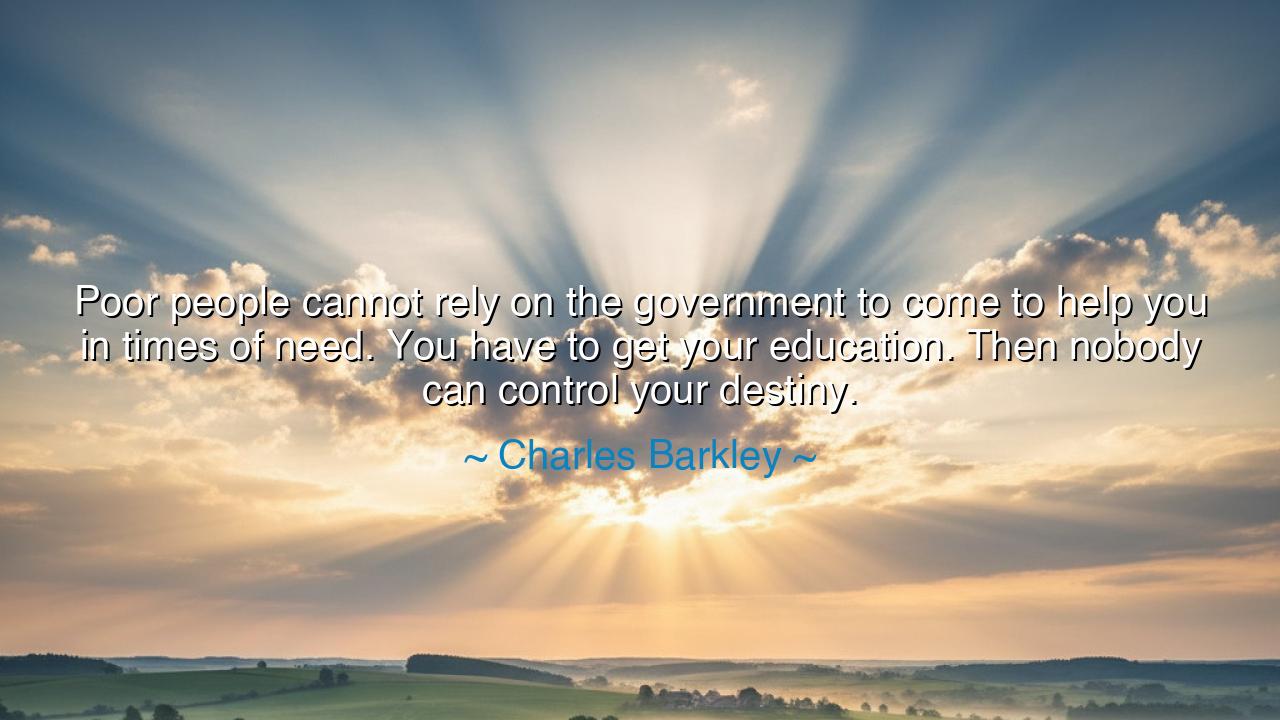
Poor people cannot rely on the government to come to help you in
Poor people cannot rely on the government to come to help you in times of need. You have to get your education. Then nobody can control your destiny.






"Poor people cannot rely on the government to come to help you in times of need. You have to get your education. Then nobody can control your destiny." – Charles Barkley
In this blunt and powerful declaration, Charles Barkley, the basketball legend turned social commentator, speaks not as an athlete but as a philosopher forged by hardship. His words carry the rhythm of lived truth and the wisdom of self-reliance. When he says that “poor people cannot rely on the government,” he is not condemning the poor, but awakening them. He reminds us that salvation does not come from systems or politicians—it comes from within. The path from poverty to freedom is not paved by policy, but by education, the great equalizer of mankind. In this statement, Barkley calls upon every soul to take command of their destiny—to rise through knowledge, perseverance, and the power of self-determination.
The origin of this quote lies in Barkley’s own journey. Born into humble beginnings in Leeds, Alabama, he grew up in a time when racial and economic barriers seemed unshakable. He witnessed firsthand how communities too often waited for change from without, while the true source of transformation lay within. Having risen from poverty to become one of the greatest players in NBA history, Barkley understood that government programs, while helpful, could never replace personal effort and education. His words reflect the ancient wisdom of the self-made man—the belief that freedom is not granted by others, but earned through discipline and learning.
Barkley’s insight reaches back to the very foundations of civilization. For in every age, the rise of individuals and nations alike has depended upon education as the engine of liberation. Governments may build roads and issue decrees, but only the pursuit of knowledge can build character and break chains. In the style of the ancients, his words echo the teachings of philosophers like Epictetus, the slave who became a sage, proclaiming that no man is truly free until he governs his own mind. Likewise, Barkley’s counsel is a call to mastery—not of wealth or power, but of self.
Consider the story of Booker T. Washington, born into slavery yet destined to become one of America’s great educators. When freedom came, he did not wait for the government to grant opportunity; he sought it through learning. By founding the Tuskegee Institute, he transformed generations of poor and disenfranchised people, proving that education is the truest form of emancipation. Like Barkley, Washington understood that while laws may open doors, only knowledge allows one to walk through them. His life stands as a living testament to the truth that no one—no ruler, no system, no circumstance—can control the destiny of a mind awakened by learning.
The deeper meaning of Barkley’s words lies in the eternal struggle between dependence and empowerment. To rely wholly on government is to surrender one’s sovereignty; to cultivate knowledge is to reclaim it. Governments, like seasons, change; they rise and fall, promise and forget. But education, once gained, cannot be taken away. It is armor against manipulation, a torch in times of darkness, and a compass in the chaos of life. The educated man or woman does not beg for opportunity—they create it. They do not wait for rescue—they build their own bridge to freedom.
And yet, Barkley’s message is not without compassion. He does not despise those who suffer; he calls them to strength. His voice, though stern, is filled with love—the kind of love that demands accountability. He understands that poverty is not only a lack of money but often a lack of access, vision, and belief. Thus, his plea for education is not merely about academics—it is about awakening potential, about empowering the powerless to see that they, too, can rise above their circumstances. For when one learns, one no longer depends; one begins to lead.
The lesson of this quote is as enduring as it is urgent: do not wait for others to build your future. Governments may fail, systems may falter, but knowledge endures. Seek learning not only in schools, but in every struggle and every day. Let education be the fortress of your dignity and the foundation of your freedom. When you learn, you liberate your mind; when you act, you shape your destiny.
So, remember Barkley’s words as a call to action, not despair. Do not wait for rescue—become your own salvation. Let the pursuit of knowledge become your inheritance, and your discipline your crown. For no government, no poverty, and no circumstance can chain the spirit of one who has mastered the power of the mind. Education is not merely a path out of poverty—it is the stairway to immortality, where no one, and nothing, can control your destiny again.






AAdministratorAdministrator
Welcome, honored guests. Please leave a comment, we will respond soon